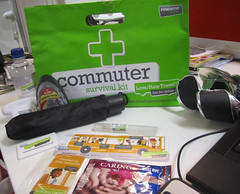We all know the value of preparation, whether for an important meeting, a big game, hosting a party, insurance needs – and especially for emergency situations. By evaluating the state of your health, your current needs and what you might require in the event of a disaster, you can be ready for almost anything. Here are some things to consider:
- Identify the resources you use daily and what you might do if they become limited or unavailable.
- Make sure that you have an adequate supply of all your medications, to last you for a short period when refills may not be available.
- Prepare an emergency supply kit (review our section “Stocking Your Supply Kit”)
- Know the safest places in your home for each type of emergency and learn the best escape routes as well.
- Plan in advance for a temporary place to stay, in case you are forced to evacuate.
- If you own a pet, consider where that pet may stay if it is not allowed to accompany you to a shelter or to someone’s home where you will be a guest.
- Know where all of your medical, insurance and other important documents are located, and make sure they can be accessed quickly.
- If you have a communication disability, be sure that your emergency information explains the best way to communicate with you.
|
|
|
|
 |
|
Our lives are enriched by good and loyal friends. This is especially clear during an emergency crisis. So create a support network of friends who can provide assistance for you, should you need it.
- Share every element of your disaster plan with your support network.
- Arrange for members of your support network to immediately check on you, should a disaster occur.
- Provide an extra house key to a member of your network.
- Provide copies of your important emergency documents, as well as a health insurance card.
- Let your support network members know where any emergency supplies are stored.
- Agree to a specific communication system for contacting one another.
- Let your support network members know when you are going out of town, and they should do the same for you.
- Practice your emergency plan together in a show of mutual support.
|
|
|
|
 |
|
Hopefully, you will not have to leave your home in the event of a disaster. But even if you are instructed to stay at home, there are certain items you should have and precautions you should take.
- Keep an adequate water supply of at least one gallon per day. Water should be stored in unbreakable containers.
- Store non-perishable foods that are nutritious, easy to carry and ready to eat.
- Keep a manual can opener in one of your drawers.
- Have non-perishable food available for any pets that live with you.
- Make sure that you have a working flashlight, with backup batteries.
- Keep your cell phone charged so that you can use it if your land line becomes temporarily disconnected.
- Store a first aid kit in your home.
|
|
|
|
 |
|
One of the most terrifying experiences is to be trapped by a fire. No matter which way you turn, you sense that there is no way out. But don’t panic…all is not lost, especially if you remember these few words of advice.
- Drop down to the floor and crawl because the air there is cleaner and less toxic. Most fatalities in a fire occur from smoke inhalation.
- Feel all doors before you open them; if a door is hot to your touch, look for an alternate way out.
- If your clothes catch on fire, drop to the floor and roll over and over to suffocate the flames.
- Do not stay around to “fight” the fire; call the fire department instead from a neighbor’s house or from your outdoor patio.
- If you are trapped in your house, move next to a window; try to signal for help.
- Never return to a burning building.
|
|
|
|
 |
|
We all love the familiarity of home, where we can enjoy our certain routines and little pleasures. But there are times when it makes sense to leave home, at least for a little while. In fact, it could be a matter of life or death. Some of the more common indicators for evacuation are these:
- Your area is without electrical power for a prolonged period.
- Flood waters are rising.
- A chemical emergency is affecting your area.
- Your home has been seriously damaged.
- Emergency personnel instruct you to evacuate.
|
|
|
|
 |
|
Many seniors are strong, healthy and capable of taking care of themselves. Others, however, may be ill or disabled, in need of assistance when an emergency situation occurs. If you are helping a senior during a disaster situation, keep these points in mind:
- Be calm and soothing, especially in situations where the elderly person may have become confused or disoriented by the disaster.
- Offer a comforting tone, as many elderly individuals are very hesitant to leave their homes, even when “riding out” the disaster is dangerous.
- Remember to ask the person you are helping whether they have any pets that need assistance too.
- Make sure that the senior you are assisting has all of his/her medications so those can be moved to safety as well.
- Be patient; keep in mind that elderly people move more slowly and stop occasionally.
|
|
|













